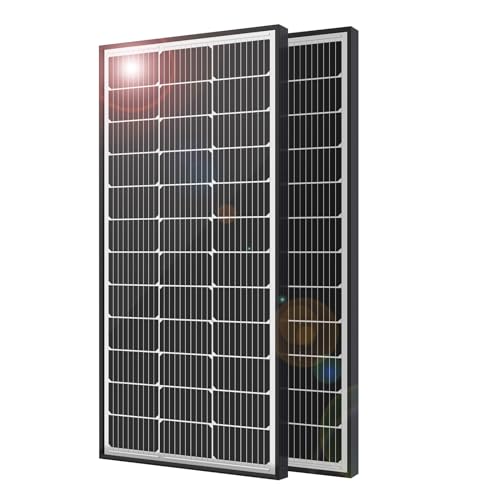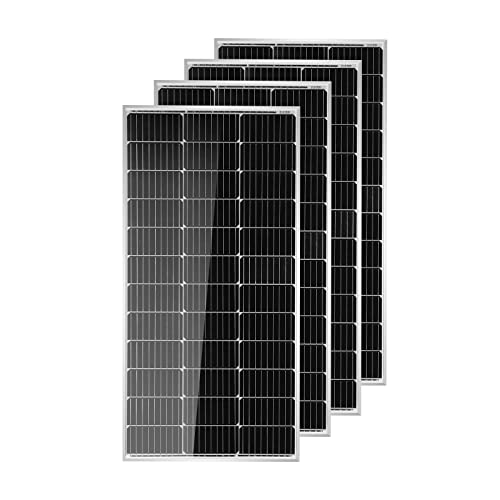In this blog post, we will be providing you with a comprehensive roundup of the top 5 solar panels currently available. As solar energy continues to gain popularity as an eco-friendly and cost-effective alternative, it becomes crucial to choose the best option for your needs. We have researched and compared various solar panels to compile a list of the absolute best choices on the market. Whether you’re a homeowner, business owner, or simply curious about solar power, this guide will help you make an informed decision and harness the power of the sun efficiently. So, let’s dive into our list of the top 5 solar panels!
Renogy Solar Panel 100W 12V
The Renogy Solar Panel 100 Watt 12 Volt is a compact and reliable solution for generating clean and efficient electricity. With its high-efficiency monocrystalline PV module, this solar panel delivers a stable output of an average 500Wh of electricity per day (depending on sun availability). Weighing only 14.1 lbs, it is 8-10% lighter and smaller than other comparable panels on the market, making it ideal for RVs, marine applications, rooftops, farms, and other off-grid setups. The panel can be easily used as a portable unit, allowing you to efficiently set it in direct sunlight regardless of where you park. Customers have praised its performance, with one reviewer mentioning its ability to keep batteries charged while using various appliances. The Renogy Solar Panel 100 Watt 12 Volt is an excellent choice for those looking for a reliable and convenient solar solution.
JJN 200W 12V Solar Panel 2 Pack with Half Cut Cells
We are excited to introduce the JJN 200 Watt 12 Volt Solar Panel 2 Pack. These solar panels are designed for maximum efficiency and performance. With the 9BB solar panel cell design and excellent Grade A cells, these panels have a high conversion rate of up to 22%. They can provide approximately 500 Wh of electricity per day, depending on the availability of sunlight. Whether you’re using them for your RV, home, boat, or other off-grid system, these solar panels are a reliable and efficient choice. Plus, with their half cut cells, they offer improved performance and durability. The panels come in a random color, adding a touch of style to your setup. Don’t miss out on the opportunity to power your adventures with the JJN 200 Watt 12 Volt Solar Panel 2 Pack.
ECO-WORTHY Solar Panel Kit: 200W, High Efficiency, for Off Grid Applications
The ECO-WORTHY 200 Watts Solar Panel Kit is a high-efficiency and versatile solution for off-grid applications. With a daily output of 800wh under 4 hours of full sunshine, this kit is perfect for RVs, caravans, marine vehicles, campers, electric scooters, golf carts, power wheels, tool trailers, backup power supplies for cabins, sheds, and homes, and more. The kit includes a high-performance monocrystalline solar panel and a 30A PWM charge controller. Customers have praised this kit for its excellent performance, allowing them to power their essentials such as large screen TVs, LED lights, and phone chargers for 4-6 hours per day on one battery, even in areas with limited sunlight. The kit is easy to install and comes with plug-and-play wiring, but some customers recommend purchasing additional mounting screws and fender washers for a secure installation. Overall, customers have found this kit to be a great value for its price and highly recommend it for off-grid power needs.
Topsolar 100W Solar Panel Kit with Controller
The Topsolar Solar Panel Kit 100 Watt 12 Volt Monocrystalline Off Grid System is the ideal solution for various power needs such as 12v battery charging for RVs, cabins, homes, boats, caravans, and remote power use. This kit includes 4pcs Z mounting brackets and 1 pair of Red and Black Solar Cables, making it easy to set up and install with pre-drilled holes. The reviews from satisfied customers highlight the effectiveness of this kit in recharging batteries and providing power even in remote areas. The monitoring device system ensures efficient use, although some users have noted the need for occasional tightening of the connection points. Overall, this solar panel kit offers reliable and efficient power generation, making it a great choice for off-grid systems.
ECO-WORTHY 100W Monocrystalline Solar Panel
The ECO-WORTHY 100 Watt Solar Panel is a high-efficiency module designed for charging 12V/24V batteries in a variety of power systems. With a 5-year material and workmanship warranty, as well as a 25-year transferable power output warranty, you can trust in the durability and performance of this solar panel.
Featuring a versatile design, this solar panel is suitable for both on-grid and off-grid applications, making it perfect for RVs, boats, caravans, and more. It is a reliable generator component that delivers a daily output of 500wh, depending on the availability of sunlight.
Although some customers have reported lower peak wattage than advertised, the majority are satisfied with the performance of these panels, getting up to 80% of the rated wattage on any given day. Additionally, customers appreciate the compact size of the panels, making them easy to fit in small spaces such as sheds.
Overall, the ECO-WORTHY 100 Watt Solar Panel is a cost-effective solution for those seeking efficient charging capabilities in various off-grid settings. With its solid packaging, fast shipping, and positive customer reviews, this solar panel is a reliable choice for your solar power needs.
Comparing Solar Panel Options
Installation and Maintenance Guide
- First, choose the right location for your solar panels. It should be an area that receives ample sunlight throughout the day, preferably without any obstructions such as trees or buildings blocking the sunlight
- Next, install the solar panels properly. This involves securely mounting them on a stable surface, typically on the roof of your house or on a ground-mounted system. Make sure to follow the manufacturer’s instructions and consult with a professional if needed
- Finally, connect the solar panels to your electrical system. This requires the installation of an inverter, which converts the DC electricity generated by the panels into AC electricity that can be used to power your home. It’s important to hire a qualified electrician to handle this step to ensure safety and compliance with local electrical codes. Additionally, you may want to consider installing a solar battery to store excess energy for use during cloudy days or at night
Frequently Asked Questions about Solar Panels
Can solar panels be used to power an entire home or business?
Yes, solar panels can be used to power an entire home or business. Solar panels convert sunlight into electricity using photovoltaic cells. The electricity generated by solar panels can be used to power various appliances, lighting, heating, and cooling systems within the building. In some cases, excess electricity generated by the panels can be stored in batteries for later use. If the solar panels produce more electricity than is consumed, it can even be fed back into the grid, allowing the home or business owner to earn credits or receive payments from the utility company. However, the ability of solar panels to power an entire home or business depends on various factors such as the size of the solar panel system, the amount of sunlight received, and the energy consumption of the building. It is also important to consider energy-saving measures and energy-efficient appliances to optimize the overall energy consumption of the building.
What are solar panels and how do they work?
Solar panels are devices that convert sunlight into electricity. They are made up of multiple small units called solar cells, which are usually made from semiconductor materials such as silicon. When sunlight hits these cells, they absorb the photons (particles of light) and release electrons from their atoms.
This process creates an electric current, which can be captured and utilized. The solar cells are connected in series or parallel to form a larger unit, known as a solar panel. The more cells a panel has, the higher its power output.
The solar panel’s efficiency is crucial, as it determines how much sunlight can be converted into usable electricity. Factors such as the quality of the solar cells, the angle and orientation of the panel, and the amount of sunlight received all affect the efficiency.
To generate electricity from solar panels, they are typically installed on rooftops or open areas with unobstructed access to sunlight. When sunlight shines on the solar panels, the electric current produced by the cells is collected by conductive metal plates and then transferred to an inverter.
The inverter then converts the direct current (DC) electricity generated by the solar panels into alternating current (AC) electricity, which is compatible with standard household appliances and the electric grid. This AC electricity can either be used immediately or fed into the electrical grid, allowing you to receive credits or even earn money through net metering or feed-in-tariff programs.
Solar panels are a sustainable and renewable source of energy since they rely on the sun’s rays, which are freely available. They do not produce greenhouse gas emissions during operation, making them an environmentally friendly choice for generating electricity.
It is worth noting that solar panels require regular maintenance, such as cleaning the surface to remove dirt and debris, as well as periodic inspection to ensure optimal performance.













